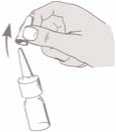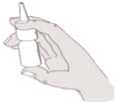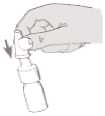Desmopressin Nasal Spray 10 Micrograms/Dose
Out of date information, search anotherDesmopressin Nasal Spray 10 micrograms/dose
(desmopressin acetate)
Patient Information Leaflet
Read all of this leaflet carefully before you start
taking this medicine.
- Keep this leaflet. You may need to read it again.
- This medicine has been prescribed for you. Do not pass it on to others. It may harm them, even if their symptoms are the same as yours.
- If you have any further questions, ask your doctor or pharmacist.
- If you have any of the side effects, or if you notice any side effects not listed, please tell your doctor or pharmacist.
Your medicine is called Desmopressin Nasal Spray 10 micrograms/dose but will be referred to as Desmopressin nasal spray throughout the leaflet.
In this leaflet:
What Desmopressin is and what it is used for
Before you use Desmopressin nasal spray
^ How to use Desmopressin nasal spray [4 Possible side effects .5 How to store Desmopressin nasal spray Further information
What Desmopressin is and what it is used for
The ingredient that makes the spray work (the active substance) is called desmopressin. Desmopressin is an antidiuretic, which reduces the amount of urine produced by the kidneys.
Desmopressin nasal spray is used to:
• treat and diagnose a chronic disease called diabetes insipidus which causes extreme thirst and continuous production of large volumes of dilute urine. Important: Not to be confused with diabetes mellitus (sugar diabetes)
• treat frequent urination during the night in adults (nocturia) associated with multiple sclerosis
• investigate kidney function.
Before you use Desmopressin nasal spray
Do not use Desmopressin nasal spray if you:
• are allergic (hypersensitive) to desmopressin or any of the other ingredients in Desmopressin nasal spray (see section 6)
• drink unusually large amounts of fluid (polydipsia)
• suffer from heart problems, high blood pressure or other diseases needing treatment with diuretics (water tablets)
• are elderly (over the age of 65 years)
• suffer with alcohol abuse.
• have moderate or severe kidney problems
• have been told you have hyponatraemia (very low levels of sodium in your blood)
• have syndrome of inappropriate ADH secretion (SIADH).
Check with your doctor or pharmacist before
using Desmopressin nasal spray if you have:
• kidney disease or bladder problems
• cystic fibrosis
• a medical condition causing fluid and/or electrolyte imbalance in the body
(with symptoms such as being sick, diarrhoea, fever).
• increased pressure in the skull (intracranial pressure).
• are elderly or have low sodium levels in your blood
• are on a low potassium diet.
Taking other medicines
Please tell your doctor or pharmacist if you are taking or have recently taken any other medicines, including medicines obtained without a prescription. Especially:
• tricyclic antidepressants (used to treat depression e.g. amitriptyline or imipramine)
• carbamazepine (used to treat epilepsy)
• chlorpromazine (used to treat psychosis or schizophrenia)
• indomethacin (painkillers called non-steroidal anti-inflammatory drugs (NSAIDs)).
Fluid intake
• Before you start treatment with this medicine, your doctor should give you advice about fluid intake.
• When using this medicine for nocturia or to investigate kidney function, keep your fluid intake to a minimum from 1 hour before a dose until 8 hours after a dose.
• Too much fluid intake may lead to a build up of water, which dilutes the salt in the body. This can occur with or without warnings or symptoms, which include unusually bad or prolonged headache, feeling or being sick, unexplained weight gain and in serious cases, fits or swelling of the brain. If you have any of these symptoms, stop the treatment and contact your doctor at once.
Pregnancy and breastfeeding
Desmopressin nasal spray can be used during breastfeeding but should only be used in pregnancy as directed by a doctor.
Ask your doctor or pharmacist for advice before taking any medicine.
Important information about one of the ingredients of Desmopressin nasal spray
This medicine contains 0.042mg potassium per dose. To be taken into consideration by patients with reduced kidney function or patients on a controlled potassium diet.
Tests
Your blood pressure and weight may be monitored whilst you are using this medicine.
rp How to use Desmopressin nasal spray
Always use Desmopressin nasal spray exactly as your doctor has told you. If you are not sure, check with your doctor or pharmacist.
Ref: LTT0011/180912/1/F



3. Hold the spray bottle as shown in the picture.


Usual doses: Where 2 sprays are required you should give 1 spray into each nostril unless directed otherwise.
• Nocturia
Adults under 65 years old- 1 or 2 sprays at bedtime.
Do not repeat the dose in a 24 hour period. Do not drink for 8 hours after using the spray except to satisfy thirst.
• Diabetes insipidus
Treatment: Adults and children - 1 or 2 sprays once or twice a day.
Diagnosis: Adults and children - 2 sprays.
• To investigate kidney function Adults - 2 sprays into each nostril Children aged 1 - 15 year old - 1 spray into each nostril
Children under 1 year old - 1 spray
When using this medicine for diabetes insipidus or kidney function investigations keep your fluid intake to a minimum (not more than 0.5 litres) from 1 hour before a dose until 8 hours after a dose.
Instructions for use:
1. Blow your nose, then remove the dust cap on the spray bottle.
2. To ensure the correct dose, it is important that the bottom of the plastic tube inside the bottle is covered with the fluid.
Before you use the spray for the first time, the pump must be filled. To do this, press the pump down 5 times or until you get a fine mist. The spray is then ready for use. If the nasal spray is not used daily, the pump has to be filled again before use.
4. Tilt your head back slightly and insert the tip of the spray into the nostril. Hold your breath without sniffing. Press the spray once. If you have to take more than one dose, alternate between the right and left nostril.
5. Replace the dust cap. Store the bottle at room temperature.
If you use more Desmopressin nasal spray than you should
An overdose may lengthen the effect of desmopressin and increase the risk of water build up in the body and low blood salt, symptoms include fits. If you use more Desmopressin nasal spray than prescribed, contact your doctor, pharmacist or the nearest hospital at once.
If you forget to use Desmopressin nasal spray
Do not use a double dose to make up for a forgotten dose.
Possible side effects
Like all medicines, Desmopressin nasal spray can cause side effects, although not everybody gets them.
Stop using the spray and tell your doctor as soon as possible if you have any of the following symptoms:
• itching, skin rashes, swelling of the face, lips or throat, difficulty in breathing - they may be a sign of an allergic reaction.
• symptoms of a build up of water in the body, reducing the amount of salt in the body: unusually unexplained weight gain, headache, feeling and / or being sick, and in serious cases, fits or brain swelling.
Other effects which have been reported include:
• unusual changes in moods (aggression has been reported in children)
• tummy pain, blocked or runny nose, nosebleeds.
If any of the side effects gets serious, or if you notice any side effects not listed in this leaflet, please tell your doctor.
How to store Desmopressin nasal spray
Do not store above 25°C.
Keep out of the sight and reach of children.
Do not use Desmopressin nasal spray after the expiry date which is stated on the bottle label and on the carton after "EXP”.
The expiry date refers to the last day of that month. Medicines should not be disposed of via wastewater or household waste. Ask your pharmacist how to dispose of medicines no longer required. These measures will help to protect the environment.
If the spray discoloured or show any signs of deterioration, ask your pharmacist who will advise you what to do.
[w Further Information
What Desmopressin nasal spray contains
• the active stubstance (the ingredient that makes the spray work) is desmopressin acetate. Each spray contains 10 micrograms (0.1mg in 1ml) of the active substance.
• The other ingredients are potassium sorbate, sodium chloride, hydrochloric acid and purified water.
What Desmopressin nasal spray looks like and contents of the pack
Desmopressin nasal spray is a clear solution in a amber bottle, with a white metered dose pump and clear cap.
Desmopressin nasal spray contains 5ml of solution.
Manufacturer and Licence Holder
This medicine is manufactured by Actavis BV, P.O.Box 313, NL3740 AH, The Netherlands and is procured from within the EU. Product Licence Holder: LTT Pharma Limited, Unit 18, Oxleasow Road, East Moons Moat, Redditch, Worcestershire, B98 0RE. Repackaged by Lexon (UK) Limited, Redditch, B98 0RE.
| POM PL 33723/0011 Leaflet revision date: 18/09/12
If you stop using Desmopressin nasal spray
You should only change or stop your treatment if advised by your doctor.
Blind or partially sighted?
Is this leaflet hard to see or read? Phone LTT Pharma Limited,
Tel: 01527 505414 for help.
Ref: LTT0011/180912/1/B